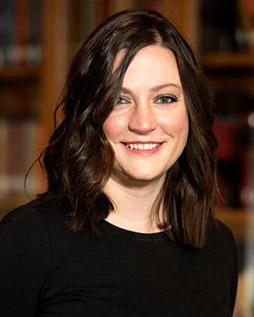
Valerie Belair-Gagnon is Assistant Professor of Journalism Studies and Director of the Minnesota Journalism Center at the Hubbard School of Journalism and Mass Communication at the University of Minnesota. She is also an affiliated fellow at the Yale Information Society Project and affiliated with the Department of Sociology at the University of Minnesota. Prior to that, she was Executive Director and Research Scholar at the Yale Information Society Project and a fellow at the Tow Center for the study of digital journalism at the Columbia University School of Journalism.
DJRG Fellow, March 2019
Dr. Belair-Gagnon published Social Media at BBC News (Routledge, 2015, paperback since 2017) and has been published in Digital Journalism , Journalism , Mobile Media and Communication , and Social Media + Society, among others. She has written for wider publics outside of academia such as in Nieman Journalism Lab, Columbia Journalism Review, BBC, and Medium, among others.
She has also presented her work at the International Communication Association annual meeting, South by Southwest, the Online News Association, the International Journalism Festival in Perugia, among others. Her works has also appeared in international outlets including Le Devoir , Daily Mail UK , Silicon India News, The Star Tribune , and MediaShift, among others.
Dr. Belair-Gagnon’s courses focuses on digital and social media, innovative technology, and journalism. She has served on the undergraduate affairs committee, graduate affairs committee and multiple departmental and College of Liberal Arts committees.
Title and abstract
Recent years have seen a boom in media and communication studies exploring the expanding boundaries of journalism, particularly in addressing how a variety of digital actors are negotiating their boundaries with those of traditional journalism.
The contours of professional journalism have substantially changed since the emergence of the internet, allowing for users not necessarily considered to be professional journalists to commit acts of journalism and be embedded in journalistic processes. From bloggers, whistleblowers, and coders to web analytics professionals and data analysis specialists, these actors have shed light on the changing practice, economics, epistemologies, norms, and ethics of the profession.
To explore the changing processes of journalism, scholars have borrowed from sociological concepts, such as boundary maintenance or gatekeeping, as a way to re-define the contours of journalism as a profession, analyzing what journalism is and what it aims to achieve in society, with particular emphasis on journalists and how particular sets of strangers are coordinating their roles within news production.
For example, Scott Eldridge (2018) argued that distinct sets of media outsiders, or “interlopers”, have driven fundamental changes in journalism norms and practices over the last several decades. Authors (date) further argued that such interlopers could be categorized as implicit or explicit interlopers or intralopers based on their perceived positions within the news process as well as their acts of journalism.
Building on these and other studies addressing the role of non-traditional actors in journalism, this conceptual piece takes a different approach in seeking to understand how these individuals (and groups, in some cases) have been committing acts of journalism (or as Sue Robinson (2014) wrote “acts of news”), and how they may be changing journalistic practice, economics, epistemologies, norms, and ethics.
This presentation borrows from recent work that have addressed how these strangers may be changing journalism (e.g., Authors, date; Eldridge, 2018). It asks more specifically: What are the underlying strangers’ practices that anchor their participation in journalism practice, economics, epistemology, norms and ethics? And how can we conceptualize how these strangers come to coordinate acts of journalism within the profession?
In doing so, this presentation first situates strangers’ acts of journalism within journalistic practice, economics, epistemologies, norms, and ethics from a transnational perspective. Then, it considers these acts as part of the networked news system. The paper then proceeds by offering the argument that media and communication scholars should work to conceptualize these non-traditional journalism actors less by their self-perceptions or by labels placed on them and more by the acts of journalism they commit.
Collectively, they should also be considered as part of a transnational information flow that is fundamentally changing the news process. This article has practical implications as it provides a starting point for the delineation of these actors, their acts of journalism, and their position within the news process and journalism more broadly. Conceptually, this presentation develops a vocabulary that would allow the recognition of acts of journalism on the part of non-traditional journalism actors in the changing profession of journalism with implications on news and information ecology.
Selected publications
- Belair-Gagnon, V. 2015. Social Media at BBC News: Re-Making Crisis Reporting. New York: Routledge.
- Belair-Gagnon, V. and Holton, A. 2018. Boundary Work, Interloper Media, And Analytics in Newsrooms: An analysis of the Roles of Web Analytics Companies in News Production. Digital Journalism.
- Holton, H. and Belair-Gagnon, V. 2018. Strangers to the Game: Interloper, Intraloper and Shifting News Production. Media and Communication. 2018.
- Belair-Gagnon, V., Owen, T., and Holton, A. 2017. UAVs and Journalism Disruption: Perspectives from Early Professional Adopters. Digital Journalism.
- Belair-Gagnon, V., Agur, C., and Frisch, N. 2017. The Changing Physical and Social Environment of Newsgathering: A Case Study of Foreign Correspondents Using Chat Apps during Unrest. Social Media + Society.